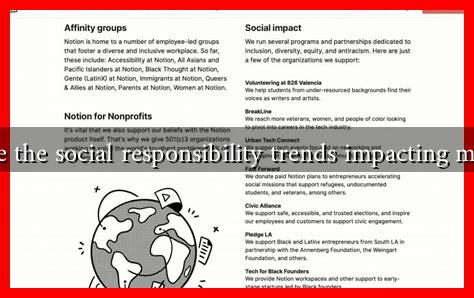-
Table of Contents
What are the Social Responsibility Trends Impacting Marketing?
In recent years, the landscape of marketing has undergone a significant transformation, driven largely by the increasing importance of social responsibility. Consumers today are more informed and engaged than ever, leading brands to adopt practices that reflect their values and commitment to social issues. This article explores the key social responsibility trends impacting marketing, providing insights into how businesses can align their strategies with the expectations of modern consumers.
The Rise of Conscious Consumerism
Conscious consumerism refers to the trend where consumers make purchasing decisions based on their values and beliefs. This shift has been fueled by a growing awareness of social, environmental, and ethical issues. According to a study by Nielsen, 66% of global consumers are willing to pay more for sustainable brands, highlighting the importance of aligning marketing strategies with social responsibility.
- Environmental Sustainability: Brands are increasingly focusing on eco-friendly practices, such as reducing carbon footprints and using sustainable materials. For example, Patagonia, an outdoor clothing brand, has built its reputation on environmental activism, encouraging customers to buy less and repair their gear instead.
- Ethical Labor Practices: Consumers are also concerned about the conditions under which products are made. Brands like Everlane have gained popularity by promoting transparency in their supply chains and ensuring fair labor practices.
Social Media and Activism
Social media has become a powerful platform for activism, allowing consumers to voice their opinions and hold brands accountable. Companies are now leveraging social media to engage with their audience on social issues, creating campaigns that resonate with their values.
- Hashtag Activism: Campaigns like #BlackLivesMatter and #MeToo have prompted brands to take a stand on social justice issues. For instance, Nike’s “Dream Crazy” campaign featuring Colin Kaepernick sparked discussions about racial inequality and police brutality, ultimately boosting the brand’s sales.
- Community Engagement: Brands are using social media to foster community engagement. For example, Ben & Jerry’s actively participates in social justice movements, using their platform to advocate for issues like climate change and racial equality.
Corporate Social Responsibility (CSR) Initiatives
Corporate Social Responsibility (CSR) initiatives have become a cornerstone of many marketing strategies. Companies are increasingly investing in programs that benefit society, which not only enhances their brand image but also builds customer loyalty.
- Philanthropic Efforts: Brands like TOMS have adopted a one-for-one model, donating a pair of shoes for every pair sold. This approach not only addresses social issues but also creates a strong emotional connection with consumers.
- Community Development: Companies are investing in local communities through various initiatives. Starbucks, for example, has committed to hiring veterans and military spouses, showcasing their dedication to social responsibility.
Transparency and Authenticity
In an age where consumers demand authenticity, brands are focusing on transparency in their marketing efforts. This trend is particularly relevant in the context of social responsibility, as consumers want to know the true impact of their purchases.
- Open Communication: Brands are sharing their sustainability goals and progress with consumers. For instance, Unilever publishes an annual sustainability report detailing their efforts to reduce environmental impact.
- Consumer Involvement: Engaging consumers in the brand’s social responsibility journey fosters loyalty. Brands like Coca-Cola have launched initiatives that allow consumers to participate in community projects, enhancing their connection to the brand.
Conclusion
The trends in social responsibility are reshaping the marketing landscape, compelling brands to adopt practices that resonate with the values of their consumers. As conscious consumerism rises, companies must prioritize environmental sustainability, ethical labor practices, and community engagement. Social media activism and transparency are also crucial in building trust and loyalty among consumers. By embracing these trends, brands can not only enhance their reputation but also contribute positively to society.
In summary, the integration of social responsibility into marketing strategies is no longer optional; it is essential for success in today’s marketplace. Brands that recognize and adapt to these trends will not only thrive but also play a vital role in creating a more sustainable and equitable world.
For further reading on the impact of social responsibility in marketing, visit Forbes.

